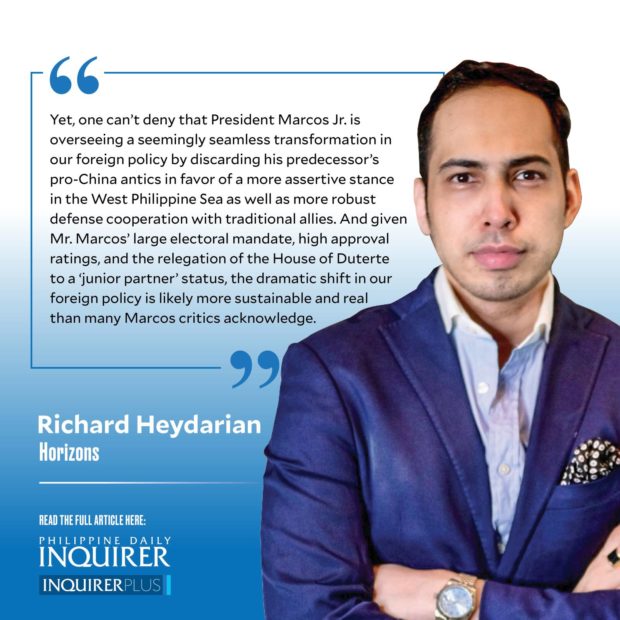Marcos Jr.’s foreign policy: A quiet revolution?
 Only Nixon could go to China!” There goes one of the most famous proverbs in high-stakes geopolitics, which, quite ironically, can be traced back to Hollywood, namely the 1991 film “Star Trek VI: The Undiscovered Country.” The logic behind the supposed “old Vulcan proverb” is pretty straightforward: Any unexpected foreign policy turn-about is most feasible under leaders with robust domestic standing.
Only Nixon could go to China!” There goes one of the most famous proverbs in high-stakes geopolitics, which, quite ironically, can be traced back to Hollywood, namely the 1991 film “Star Trek VI: The Undiscovered Country.” The logic behind the supposed “old Vulcan proverb” is pretty straightforward: Any unexpected foreign policy turn-about is most feasible under leaders with robust domestic standing.
As a relatively hawkish Republican, US President Richard Nixon’s outreach toward Maoist China in the early 1970s was less vulnerable to domestic criticism than, say, by a more dovish Democratic counterpart, who would have easily been accused of “appeasement.” In many ways, a similar dynamic is shaping the ongoing transformation in Philippine foreign policy under President Marcos Jr., yet with opposite implications for China.
To be clear, I fervently believe that a Leni Robredo or, say, Panfilo Lacson administration would have certainly taken a patriotic and strategic approach to China. Yet, one can’t deny that Mr. Marcos is overseeing a seemingly seamless transformation in our foreign policy by discarding his predecessor’s pro-China antics in favor of a more assertive stance in the West Philippine Sea as well as more robust defense cooperation with traditional allies.
And given Mr. Marcos’ large electoral mandate, high approval ratings, and the relegation of the House of Duterte to a “junior partner” status, the dramatic shift in our foreign policy is likely more sustainable and real than many Marcos critics acknowledge.
Not long ago, many confidently predicted that the current president would end up consolidating the pro-Beijing direction of Rodrigo Duterte. For instance, one reputable international news outlet published an op-ed piece entitled, “Bongbong Marcos will move the Philippines closer to China” shortly before Mr. Marcos’ expected election victory. Over the succeeding months, a whole host of news agencies and experts speculated on how China would supposedly benefit from a fully acquiescent Philippines under a Marcos-Duterte regime. In fairness, one can’t blame these observers for jumping to conclusions, since Mr. Marcos himself repeatedly backed Duterte’s China policy throughout the 2022 presidential elections.
But just as I questioned the “debt trap” thesis in the past, correctly predicting that there won’t be much of Chinese infrastructure investments in the Philippines, to begin with (See, for instance, “Duterte’s Chinese Chimera,” 4/16/18), I also penned a whole series of articles last year, which (correctly) predicted a potential major policy shift under Mr. Marcos.
In fact, shortly before his assumption of power, I penned a piece for another publication, where I forecasted “Marcos Jr. will likely adopt calibrated assertiveness towards China while welcoming pragmatic cooperation on the economic front.” By early October, I forecasted an expanded Enhanced Defense Cooperation Agreement (Edca) deal, which would give the Pentagon access to a whole host of bases close to Taiwan’s southern shores in another article.
To be clear, this piece is not about flaunting one’s scientific “predictive” capacity, but rather about the art of scenario-building. As I argued in a piece in early-2022, three factors would shape a Marcos Jr. presidency: “(i) margin of victory and, accordingly, a potentially newfound sense of personal destiny, (ii) factional politics and personalistic jostling within the ruling regime, and (iii) external pressure/encouragement from international partners, especially Washington and Beijing…” (“Marcos Jr. presidency: Three possible scenarios,” 3/22/22).
Mr. Marcos not only secured an empathic electoral victory, but he is also atop a dominant coalition, which has broadly marginalized pro-China players. Meanwhile, Mr. Marcos has been actively courted not only by Washington, but also by Tokyo, London, Brussels, and a whole host of traditional allies.
Meanwhile, Mr. Marcos’ trip to Beijing last month produced zero breakthroughs on either the West Philippine Sea disputes or a whole host of unfulfilled infrastructure investment projects. Like many experts, Beijing (incorrectly) viewed Mr. Marcos as Duterte’s strategic clone.
Barely a year into office, a self-assured Mr. Marcos has revitalized defense relations with Western powers while standing up to bullying by Eastern powers. In a bizarre twist of events, it took a Marcos to correct Duterte’s foreign policy excesses sans any major backlash at home.
rheydarian@inquirer.com.ph
















